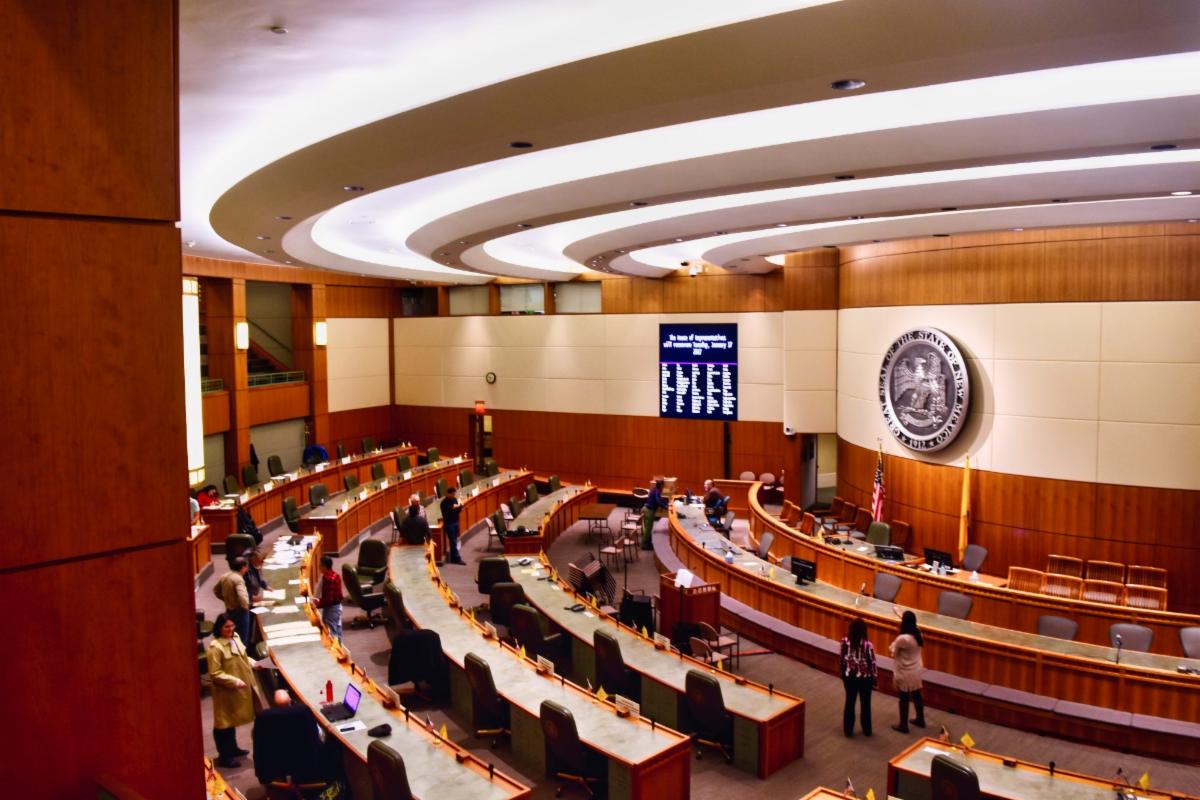
A trip across the internet reveals these highlights from special sessions past:
- N.M.’s governor can call a special session at any time.
- A special session usually lasts a few days to a week but technically can go up to 30 days (Aug. 18 in this case).
- The governor’s bills will each need a House or Senate sponsor to be introduced.
- Legislators can’t accept campaign contributions during the session, and with this being an election year that’s likely cramping some incumbent candidates’ style.
- Lawmakers can adjourn (aka sine die, a Latin term literally meaning “without day” that means the Legislature adjourns without appointing a day on which to assemble again) whenever they want, if enough rule in favor of it, even without passing any legislation. The rules require the Senate to re-convene every three days, though no legislative work is required.
- The Senate has adjourned early (sine die) under previous governors, as recently as 2016 when addressing former Gov. Susana Martinez’s budget requests and the death penalty. That session lasted 12 hours.
- During former Gov. Bill Richardson’s tenure, according to New Mexico Source, the chambers split at special sessions called in 2003 and 2008; the House went to work, but the Senate only met to adjourn. Ultimately bills were passed and signed during special sessions both of those years, according to the Legislature’s website.
- In 2022, lawmakers convened on April 5 to consider, vet and pass “Tax Rebates” which in part provided two rebates of $250 or $500 depending on tax filing status. The governor signed it April 8.
- In December of 2021, lawmakers took around a week to pass several redistricting bills as well as a medical malpractice patch that were all signed into law.
- In April of 2021, lawmakers passed both recreational marijuana and an expansion of the Local Economic Development Act (LEDA) to allow a permanent mechanism for tax revenue sharing for certain new large LEDA projects.
- The governor has 20 days after the special session to sign bills that have made it to her desk.
- There needs to be an emergency clause – three-fifths agreement by the chambers – to enact the laws right away, or they go into effect 90 days after passage (mid-November in this case if the Legislature and governor take all the time they’re allotted).
- This will be the fifth special session Lujan Grisham has called. She previously called for two special sessions in 2020, two again in 2021, and one in 2022. Topics have ranged from a COVID relief package to tax rebates to legalizing recreational marijuana.
Focusing on Public Safety This Special Session
Regarding this special session, the GACC’s Board of Directors has articulated five core beliefs that guide our organization’s position on criminal justice issues:
- High crime raises the cost of doing business and makes it harder to attract employers and workers.
- Those who commit crimes in our city and state must face swift and certain apprehension and punishment; this is a key deterrent, and in New Mexico, it’s simply not happening.
- The data-driven differentiation of offenders and deployment of technology in crime-fighting are keys to a more efficient, effective and fair justice system.
- Recent major changes to New Mexico’s justice system have made it harder to police and prosecute crime; in the end, the criminal element benefits. This includes releasing most offenders from jail pre-trial – even dangerous and repeat criminals, onerous case processing rules and timelines, nixing the grand jury as a method to secure most indictments, and the continued DOJ oversight of APD.
- Crime in Albuquerque is substantially driven by drug use, trafficking, addiction and mental health disorders.
And we believe those five core beliefs will be positively impacted by the governor’s legislative priorities, which epitomize the messaging that came out of that April Town Hall, when Farmington Mayor Nate Duckett said he hoped the “important conversation” reached the Legislature because “a legislative body needs to be listening to the people who are on the ground, dealing with it every single day.” The Chamber agrees and is supporting all eight of the governor’s proposals. Here’s why:
Proposed Public Safety Legislation
Longer Prison Sentence for Felons in Possession of a Firearm
SUPPORT: This bill would make the crime of being a felon in possession of a firearm a second-degree felony, punishable by a minimum of nine years in prison. We believe it would have an important impact on the crime problem we face by removing dangerous and violent people from our streets for a very long time.
There are some people who are simply determined to lead a life of crime. Despite past convictions, they insist on continuing to create instability and unease in our neighborhoods, engaging in dangerous and unlawful activities that prompt them to illegally carry (and use) firearms. Invariably, the perpetrators of violent crimes and robberies that we hear and read about on the news have been in and out of the justice system, arrested and convicted repeatedly, and are still carrying weapons. These are people who are likely aware of – and will always take advantage of – a low-consequences justice system with a well-greased revolving door. We must send a message they are not welcome in our state and should either go elsewhere or go to prison.
Let’s remember: a felon who chooses to carry a gun in New Mexico is not only creating the potential of a violent, tragic situation wherever they go, but they are also thumbing their nose at the justice system and laws of our state, which clearly prohibit them from carrying a gun. It is perfectly reasonable for felons who are caught carrying firearms to be sentenced to nine years in prison (or 12 years, if they are particularly serious/violent); it wouldn’t take the sentencing of very many of these dangerous criminals for word to get out that New Mexico does not intend to continue being a haven for ex-cons with guns.
Criminal Competency Changes
SUPPORT: Determinations of defendant incompetency are contributing to the revolving door crime problem in New Mexico, where those who commit serious crimes are simply released back into the community, with their cases dismissed, and are therefore able to repeatedly commit additional crimes. This is a real and regular occurrence in Albuquerque. When it happens, victims feel unsupported, law enforcement officers feel understandable frustration, new victims are needlessly created, and defendants simply rack up more arrests while failing to get the help they need.
The Albuquerque Journal has reported the Governor’s Office “released statistics culled from court records showing that more than 3,200 defendants have had their criminal cases dismissed since 2017 because they were deemed incompetent to stand trial. Once charges are dismissed, they are free to go back to their communities. (The governor) said the majority of those cases have been in Albuquerque and many involve violent crimes.”
“Streets in New Mexico aren’t safe,” the governor told the paper, “and addressing this can’t wait.”
The justice system should have a responsibility and requirement to initiate involuntary commitment proceedings against repeat criminals with severe mental health disorders, and it should not be needlessly bureaucratic or tedious to secure that commitment. Victims – and the safety of our community – must be given a higher priority and higher consideration in these cases.
Definition Change of ‘Harm to Self’ and ‘Harm to Others’
SUPPORT: Rightfully so, a high bar should be set and met when the government aims to involuntarily commit someone for mental health treatment. But a problem exists when the criteria for involuntary commitment are written so narrowly – or too restrictively – that it prevents the state from helping people who truly are a danger to themselves and the people/community around them.
That’s the situation we find ourselves in today, which can be remedied – at least, in part – by more adequately describing what it means for someone to be likely to harm themself or harm others. That’s what this legislation achieves – a more reasonable definition of the type of poor judgment, self-neglect and irrational, destructive or dangerous behaviour a person must exhibit to be considered a candidate for involuntary commitment.
Unsafe Use of Public Highways and Medians Act
SUPPORT: It’s simply unsafe for people to be in narrow medians on highways and roads in our state. We see this kind of activity far too often, and cities like Albuquerque struggle with high numbers of pedestrian deaths and accidents. In fact, in 2022, for the seventh year in a row, New Mexico was ranked as the most dangerous state for pedestrians. Albuquerque ranked as the second-deadliest city for pedestrians.
We would say to opponents that allowing people to stand mere inches from high-speed traffic in the name of civil liberty is misguided at best – the basic physics of a pickup or SUV vs. a person prove around 100 times a year in New Mexico that it is a fatality waiting to happen.
This legislation specifically targets medians narrower than 36 inches on highways with posted speed limits of 30 mph or higher. It is a reasonable, narrowly-tailored attempt to curb some of the activity that results in unsafe situations for drivers and pedestrians alike.
Law Enforcement Agency Reports on Crime Incidents/Ballistics
SUPPORT: The Chamber has long been a proponent of data-driven crime-fighting. Reliable and accurate data on crime incidents – submitted in a standardized way from every community across the state – is essential to understanding the nature of New Mexico’s crime problem and its evolution over time.
The more precise and complete we can be in our data collection, the more strategic we are able to be in identifying crime drivers (people, places, weapons, vehicles, etc.) and efficiently addressing threats to public safety. The collection and sharing of criminal justice data is critical to making progress in the fight against crime.
7It isn’t fully clear what type of crime incident or ballistic information this legislation will require law enforcement agencies to share, but we do know that (a) criminals are mobile and don’t often stay in one community, and (b) firearms are too often stolen and/or used as currency.
As a result, guns are used in multiple places, often by different people. Across the state, it should be standard practice for law enforcement agencies to collect and analyze spent bullet casings and meticulously track shots fired and firearms used by or confiscated from criminals.
Amending the Racketeering Act to Address Criminal Gangs
This bill went nowhere in the regular session, and it is essential it passes to give law enforcement the tools it needs to tackle criminal gangs. It is no secret New Mexico, like much of the nation, is struggling to deal with a spike in crime, especially the kinds committed by organized groups. These criminal enterprises need to be stopped in their tracks.
Expanding the state’s Racketeering Act to include such heinous crimes as sexual exploitation of children; threats to our law enforcement officers including escape from jail or prison; and threats to some of our communities’ most vulnerable with human trafficking are much needed updates.
The update would also target the leaders of such enterprises, specifically making it a crime to solicit or coerce another person, including a minor, into being a member of or working with their criminal enterprise, as well as financing or supervising racketeering activity.
This legislation offers those in our legal system a better tool to deal with criminal gangs. We encourage legislators to help ensure they get it.
Amending the Controlled Substances Act to include Fentanyl
This proposal has been on many leaders’ wish list for a very long time. It would amend sections of the controlled substances act and provide a penalty for when the trafficking of certain controlled substances results in the death of a human being.
It also aims to increase penalties for possession or distribution of methamphetamine in a drug-free school zone.
A first offense would result in a guilty second-degree felony and a sentence of a minimum of nine years. For a first offense resulting in death of human being, the minimum term of imprisonment would be 12 years.
The amended law would also make it unlawful for a person to distribute gamma hydroxybutyric acid or flunitrazepam to another person without that person’s knowledge and with intent to commit a crime against that person, including criminal sexual penetration. A first office would result in a third-degree felony.
For too long New Mexico has dealt with the scourge fentanyl has visited upon our residents and our streets. This update will finally give our law enforcement officials a means to attack it.
Disaster Relief
This proposal would provide zero-interest reimbursable loans to federal-disaster eligible applicants hit hard by the Ruidoso-area fires.
The fund would be used for projects to replace or repair public infrastructure damaged by fire, flooding, debris flows or hail caused by or stemming from the Salt or South Fork fires or by storm events that served as the basis for the Federal Emergency Management Agency’s (FEMA) disaster declaration.
The loans would be paid back with FEMA funds and will have to be paid within 90 days of having received the public assistance.
One hundred million dollars is appropriated from the general fund to the local government division of the Department of Finance and Administration for expenditure in fiscal years 2025 and 2026.
This is a Doable Agenda
The bills being proposed by the governor would – if passed and not watered down – are doable in the rubric of a special session and will improve public safety and respond to some crime drivers in New Mexico.
For example, repeat violent criminals feel too comfortable on our streets and frequently carry firearms, despite legal prohibitions against felons carrying guns. These individuals are significantly responsible for destabilizing neighborhoods and communities, and they are often involved in drug trafficking and organized property crime rings. Removing them from our streets for a longer period of time not only improves public safety while they’re away but sends a strong message to other violent criminals that they could be next.
Attacking fentanyl will not only address crime – it will save lives.
Preventing the rampant and repeated release of mentally unstable criminal defendants back into the community – and requiring treatment and intervention for them – will reduce many types of crime incidents and provide more justice to victims of these perpetrators’ crimes. Other proposed policies – like limiting pedestrian activity in narrow medians and requiring the collection and sharing of criminal justice data statewide – are commonsense measures, important in a state that has been a national leader in pedestrian deaths and historically slow in prioritizing data-driven crime-fighting and deploying new crime technology.
And our friends and neighbors in the Ruidoso area need our state’s assistance to come back from the devastating fires.
The eyes of residents and businesses will be on Santa Fe this week, as will ours. We urge elected leaders to set aside past differences, make the most of their time this special session and choose together to make New Mexico a safer place.



